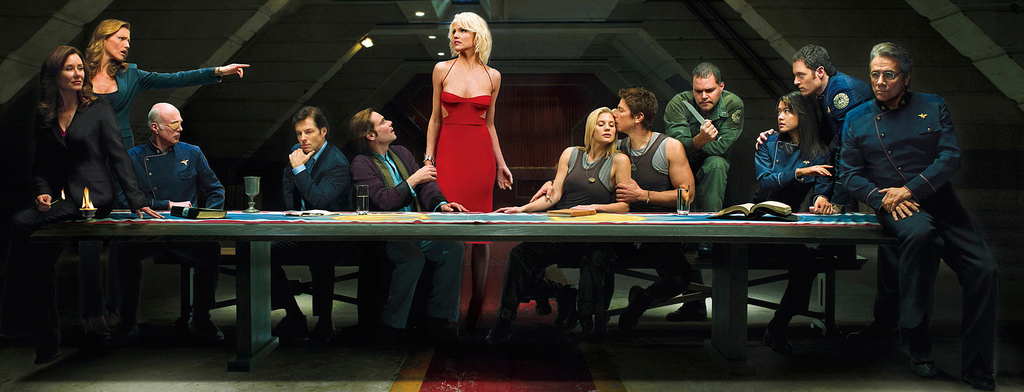This coming weekend wraps up the summer blockbuster season with the release of Neil Blomkamp’s sci-fi opus Elysium, the story of a nightmarish near-future where the bulk of humanity suffers on a dying, overcrowded Earth while the wealthy live in an orbital paradise. While the concept and promotional campaign have made me pretty excited to see it, I’m a little apprehensive about the use of allegory in the film, not because I entirely disagree with the ideal implied in the film’s marketing – a member of the “99%” breaking into the world of the “1%” to try and balance the scales – but because I’m worried that the movie will use the engine of sci-fi to play out a flashy, guilt-free revenge fantasy instead of doing what sci-fi does best, which is forcing you to step out of your shoes and re-examine your worldview.
A brief but necessary interruption: This isn’t an attack on Elysium. I wouldn’t presume to attack a movie I haven’t seen, and as returning Deadshirt readers know, this is a site built on the idea of celebrating good work, not trashing what we don’t like. I’ll be seeing Elysium opening weekend and I expect I’ll enjoy it. This is a meditation of sci-fi fiction in general, using Elysium as a jumping-off point.
The beauty of science fiction, aside from making stories about giant robots possible, is that it allows you, the viewer, to project yourself into new situations outside of the context of the real world. In a political or war thriller, if you’re an American, you’re siding with America. It doesn’t much matter what America does in the movie; even if they do something horrific, you’re likely to make apologies for them. Sci-fi can take that sort of allegiance out of the equation, or even play games with it. For instance, Neil Blomkamp’s previous film, District 9, tells a story in which humans are in conflict against non-humans, but the humans turn out to be the villains. James Cameron’s Avatar uses this same trope, though perhaps less gracefully. It may be a heavy-handed technique, but it’s used because it an effective, if not so subtle method of pushing you out of your box and forcing you to examine your own actions and views.
It’s also a device that works best when you don’t see it coming. Battlestar Galactica is a perfect example of a work of science fiction that plays your own assumptions against you. Without spoiling too much, BSG assumes that you, the audience, will automatically identify with the human characters, but as the story unfolds you realize that you’ve been accepting their point of view without thinking, and that maybe there’s more to these Cylons than the humans think there is. The result is that you, and the viewpoint characters, must challenge your preconceptions on how you define humanity, sentience, life itself.
What does this have to do with Elysium? Because, from the looks of things (again, it hasn’t been released yet) the point-of-view character is the everyman, the representative of the hard-working, mistreated working class, ostensibly us, and the antagonists are the privileged, the other. They are already, from the perspective of many young, working- and middle-class Americans (read: filmgoers) the villains of our national narrative. They are not the target audience of this film. (The target audience is, on the other hand, something you can determine from advertisements alone.) My point is, if the message of this film is “the wealthy will exploit you and leave you to rot, and the only way to stop it is to topple their empire, steal from the rich and give to the poor” then this film will not accomplish anything. You are unlikely to persuade anyone of that idea that didn’t already have it when they walked into the movie.
Sci-fi allegories reach their greatest potential when they turn the mirror back on the audience. Consider Wall-E, one of the finest sci-fi movies of the last decade. In addition to being visually inventive and emotionally compelling, Wall-E had many layers of social commentary about us. There was the obvious environmental message, which was the most heavy-handed in order make sure the kids in the audience got it, but there were more criticisms on modern life presented at different levels, as well. Just below the surface and easy for most of the adult viewers to see was the commentary on our disconnected, technology-driven lifestyle. Beneath that is the more subtle theme of characters both human and machine coasting through life, following clearly-defined pathways rather than forging their own destinies, until Wall-E, a being who has lived for centuries without any sort of societal boundaries, shows them how to create their own destinies. Wall-E is a film in which we, the audience are the ones who need to rethink our lives, presented in the form of a story about an adorable lovesick robot.
What’s more, that message reached more of the people it needed to reach because it wasn’t advertised. Very few people bought a ticket to see Wall-E thinking “I hope this movie teaches me about the dangers of pollution and the value of real human interaction,” they went to see it because it looked like a fun movie about a cute robot, and it delivered on both of those levels. That’s what sci-fi does at its best. It entertains and it teaches you about yourself, but you don’t have to think about the lesson until the drive home.
This is why Elysium, while it may turn out to be an exciting, engaging movie anyway, isn’t likely to be an effective piece of allegory unless it does something truly unexpected: turn the mirror of sci-fi back around on the audience and force us to take on the point of view of the “1%.” We have to leave that movie feeling like we have a better understanding of these people who seem so different from us, and how they feel about us. We have to, at least briefly, see ourselves the way they see us. If it’s just the story of a working man triumphantly knocking the rich down a few pegs without examining or humanizing the other point of view (like the similarly-themed In Time) then it’s not doing it’s job as science fiction, instead only providing frustrated viewers a fantasy world in which they can imagine dragging David Koch out of his palatial apartment, moving in and getting away with it.
If this is truly one of the goals of Elysium, to provide the audience a new perspective on their economic frustrations and help foster understanding between two groups that have seemingly irreconcilable differences, then they are going about it exactly the right way: by promoting the movie specifically toward the group of people it’s meant to enlighten. We’re all going into Elysium expecting to see Matt Damon kick ass through the ruling class’s castle in the sky and bring fire back down from Olympus, but wouldn’t it be a trip if we get something else entirely?
What if we learn something?






Hey,
This is the 6th or 7th post I’ve read in rapid succession on your site and I had to stop and let you know how enjoyable I’m finding it. Now I return to reading…